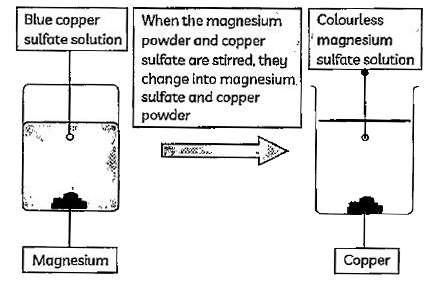When a metal X is added to dilute HCl solution, there is no evolution of gas. The metal X is
K
Na
Ag
Zn
The correct Answer is:C
To solve the question, "When a metal X is added to dilute HCl solution, there is no evolution of gas. The metal X is," we will follow these steps:
Step 1: Understand the Reaction
When a metal reacts with dilute hydrochloric acid (HCl), it can either evolve hydrogen gas or not, depending on the metal's reactivity compared to hydrogen.
Step 2: Identify the Metals
We are given four metals to consider:
- A: Potassium (K)
- B: Sodium (Na)
- C: Silver (Ag)
- D: Zinc (Zn)
Step 3: Refer to the Reactivity Series
The reactivity series ranks metals based on their ability to displace hydrogen from acids. Metals above hydrogen in the reactivity series will react with dilute HCl to produce hydrogen gas, while metals below hydrogen will not.
Step 4: Analyze Each Metal
1. Potassium (K): Highly reactive, will react with dilute HCl and produce hydrogen gas.
2. Sodium (Na): Also highly reactive, will react with dilute HCl and produce hydrogen gas.
3. Silver (Ag): Less reactive than hydrogen, will not react with dilute HCl, hence no gas will be evolved.
4. Zinc (Zn): Reactive enough to displace hydrogen from HCl, will produce hydrogen gas.
Step 5: Conclusion
Since we are looking for a metal that does not evolve gas when added to dilute HCl, the only metal from the options that fits this criterion is Silver (Ag).
Final Answer
The metal X is Silver (Ag).
---
When a metal reacts with dilute hydrochloric acid (HCl), it can either evolve hydrogen gas or not, depending on the metal's reactivity compared to hydrogen.
We are given four metals to consider:
- A: Potassium (K)
- B: Sodium (Na)
- C: Silver (Ag)
- D: Zinc (Zn)
The reactivity series ranks metals based on their ability to displace hydrogen from acids. Metals above hydrogen in the reactivity series will react with dilute HCl to produce hydrogen gas, while metals below hydrogen will not.
1. Potassium (K): Highly reactive, will react with dilute HCl and produce hydrogen gas.
2. Sodium (Na): Also highly reactive, will react with dilute HCl and produce hydrogen gas.
3. Silver (Ag): Less reactive than hydrogen, will not react with dilute HCl, hence no gas will be evolved.
4. Zinc (Zn): Reactive enough to displace hydrogen from HCl, will produce hydrogen gas.
Since we are looking for a metal that does not evolve gas when added to dilute HCl, the only metal from the options that fits this criterion is Silver (Ag).
The metal X is Silver (Ag).
Topper's Solved these Questions
- MATERIALS : METALS AND NON-METALSBOOK - MTG IIT JEE FOUNDATIONCHAPTER - MATERIALS : METALS AND NON-METALSEXERCISE - EXERCISE MCQ.s (Level-2)
20 Videos
- MATERIALS : METALS AND NON-METALSBOOK - MTG IIT JEE FOUNDATIONCHAPTER - MATERIALS : METALS AND NON-METALSEXERCISE - EXERCISE (Match the Following)
5 Videos
- MATERIALS : METALS AND NON-METALSBOOK - MTG IIT JEE FOUNDATIONCHAPTER - MATERIALS : METALS AND NON-METALSEXERCISE - NCERT Section
11 Videos
- FOOTSTEPS towards(CBSE Board)BOOK - MTG IIT JEE FOUNDATIONCHAPTER - FOOTSTEPS towards(CBSE Board)EXERCISE - SECTION - D
14 Videos
- MATTER : ELEMENTS COMPOUNDS AND MIXTURES BOOK - MTG IIT JEE FOUNDATIONCHAPTER - MATTER : ELEMENTS COMPOUNDS AND MIXTURES EXERCISE - EXERCISE (INTEGER/NUMERICAL VALUE )
5 Videos
Similar Questions
When a metalis added to dilute HCl solution, there is no evolution of gas.Metal is-
View SolutionWhen zinc metal is treated with a dilute solution of a strong acid, a gas is evolved which is utilised in the hydrogenation of oil. Name the gas evolved . Write the chemical equation of the reaction involved and also wrote a test to detect the gas formed.
View Solution
Knowledge Check
When a metal X is added to dilute HCl solution, there is no evolution of gas. The metal X is
AKBNaCAgDZnWhen zinc metal is added to dilute H2SO4 solution, hydrogen is evolved. In this zinc undergoes
AReductionBOxidationCDissolutionDNone of the aboveWhen zinc metal is heated with caustic soda solution, the gas evolved is
AhydrogenBcarbon dioxideCoxygenDhydrogen chloride
When zinc metal is treated with a dilute solution of a strong acid, a gas is evolved which is utilized in the hydrogenation of oil. Name the gas evolved. Write the chemical equation of the reaction involved and also write a test to detect the gas formed.
View SolutionWhen zinc metal is treated with a dilute solution of a strong acid, a gas is evolved which is utilised in the hydrogenation of oil. Name the gas evolved . Write the chemical equation of the reaction involved and also wrote a test to detect the gas formed.
View SolutionWhen zinc metal is treated with a dilute solution of a strong acid, a gas is evolved, which is used in the hydrogenation of oils. Name the gas evolved. Write the chemical equation of the reaction involved and also write a test to detect the gas formed.
View SolutionAssertion (A): When a piece of copper metal is added to dilute sulphuric acid, the solution turns blue.
Reason (R): Copper reacts with dilute sulphuric acid to form blue copper (II) sulphate solution.
View Solution
Some metals are more reactive than others. In an experiment o strip of metal is added to a solution of a compound of another metal A more reactive metal displaces (pushes out) a less reactive metal from its compound
When hydrogen sulphide gas is passed into an aqueous solutions of copper sulphate?
View Solution
